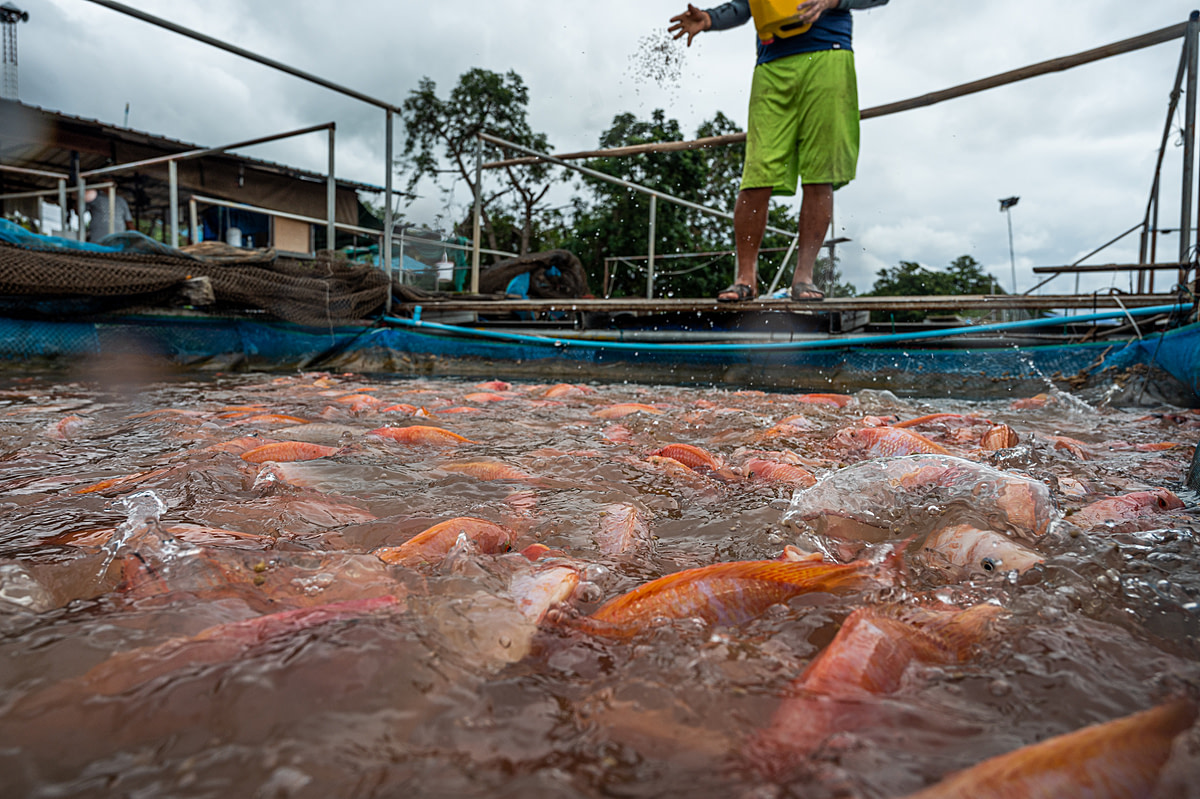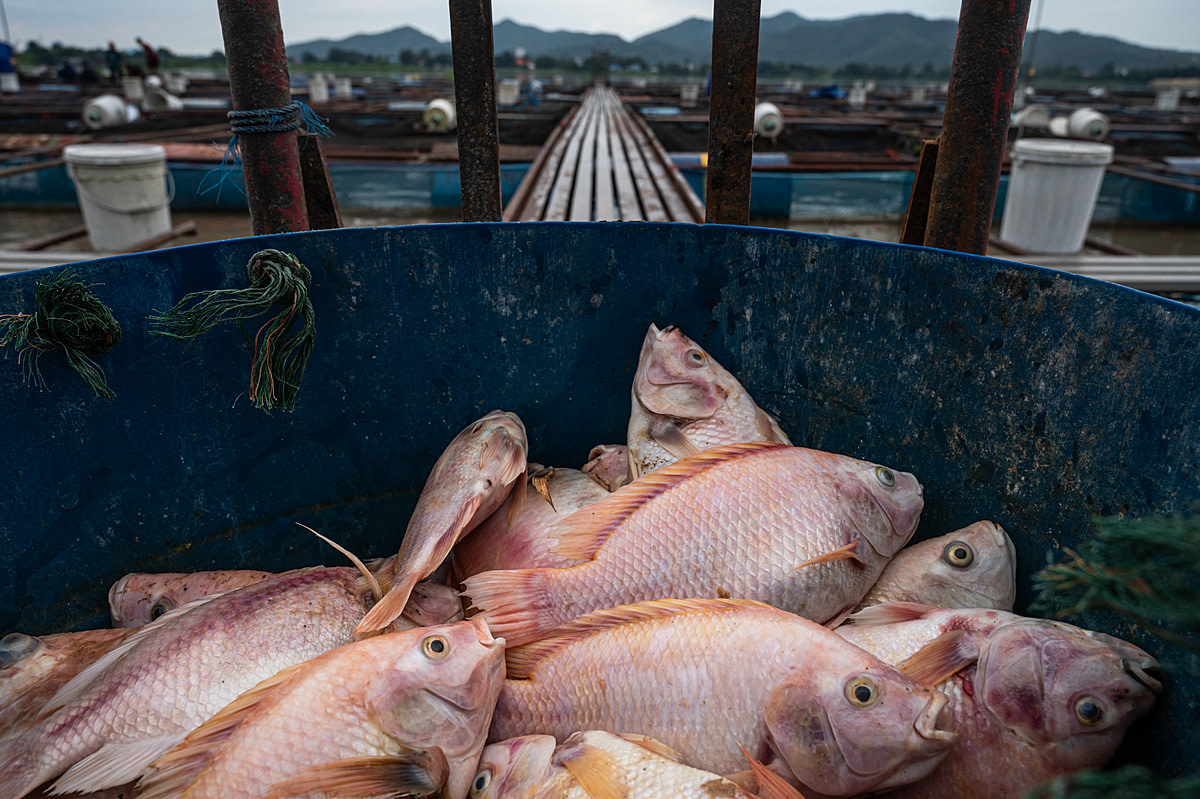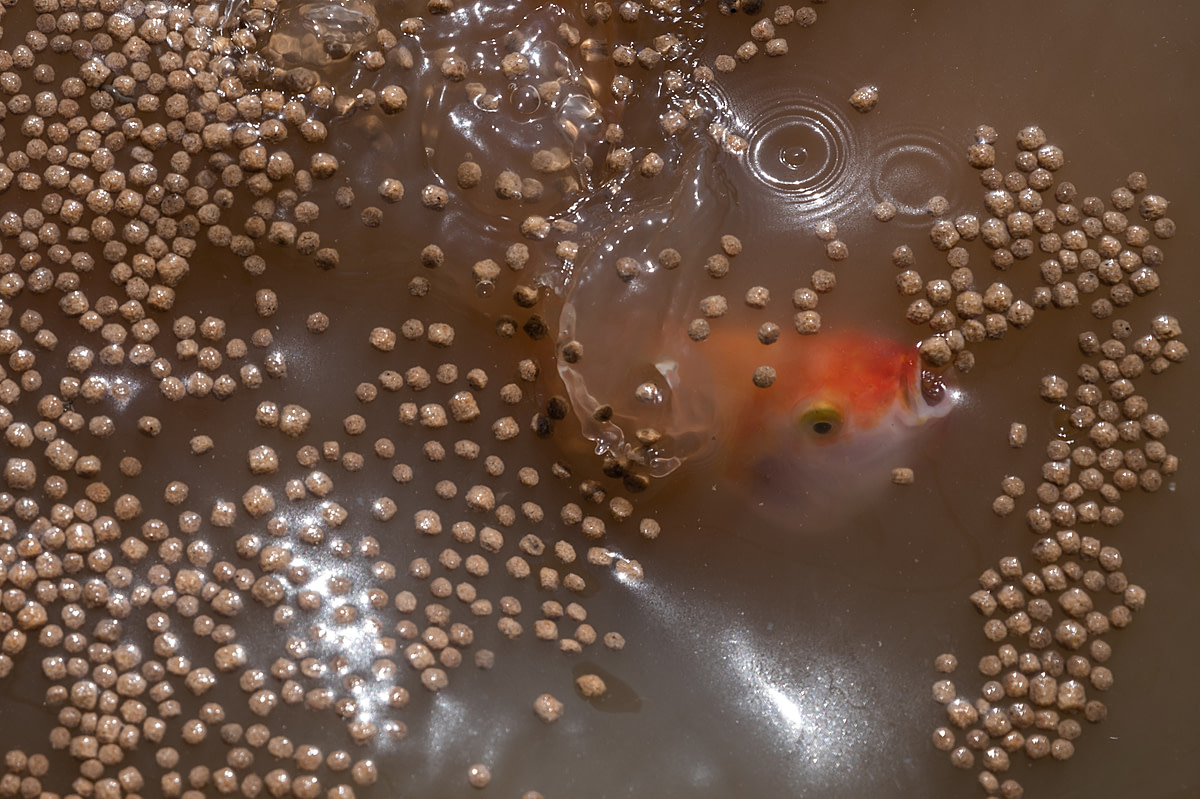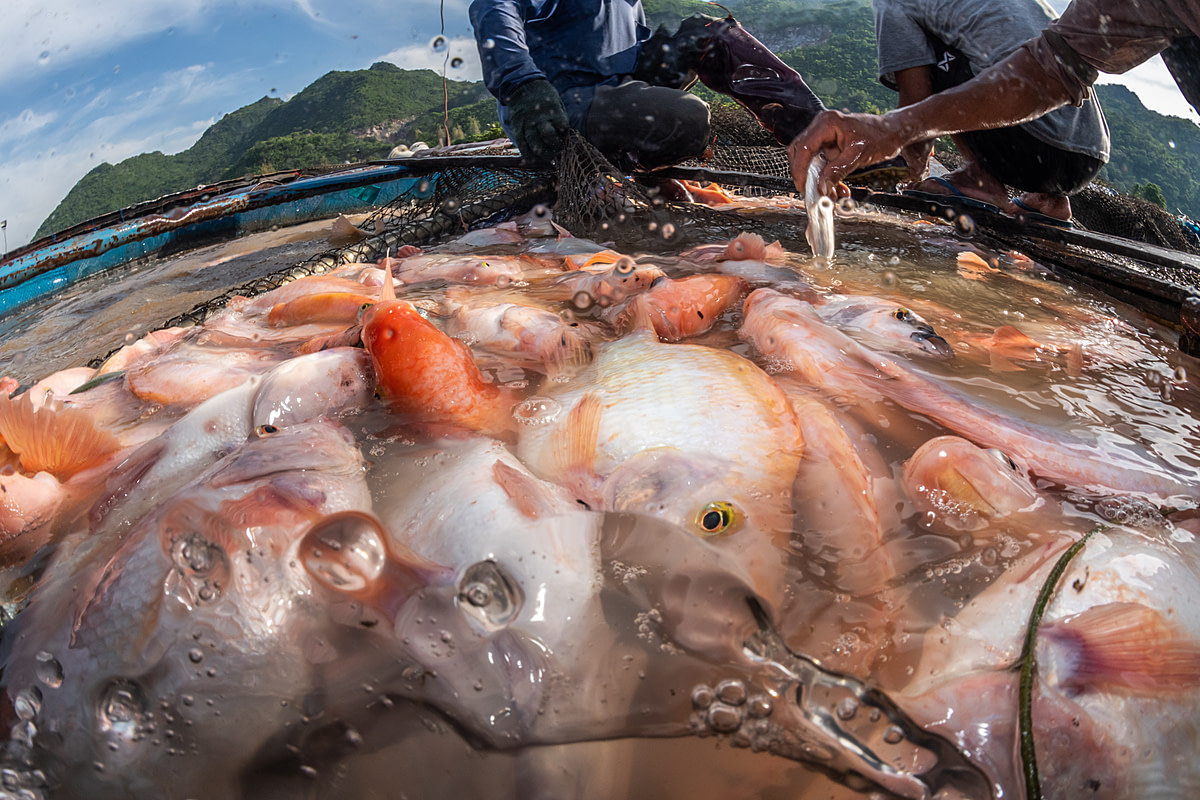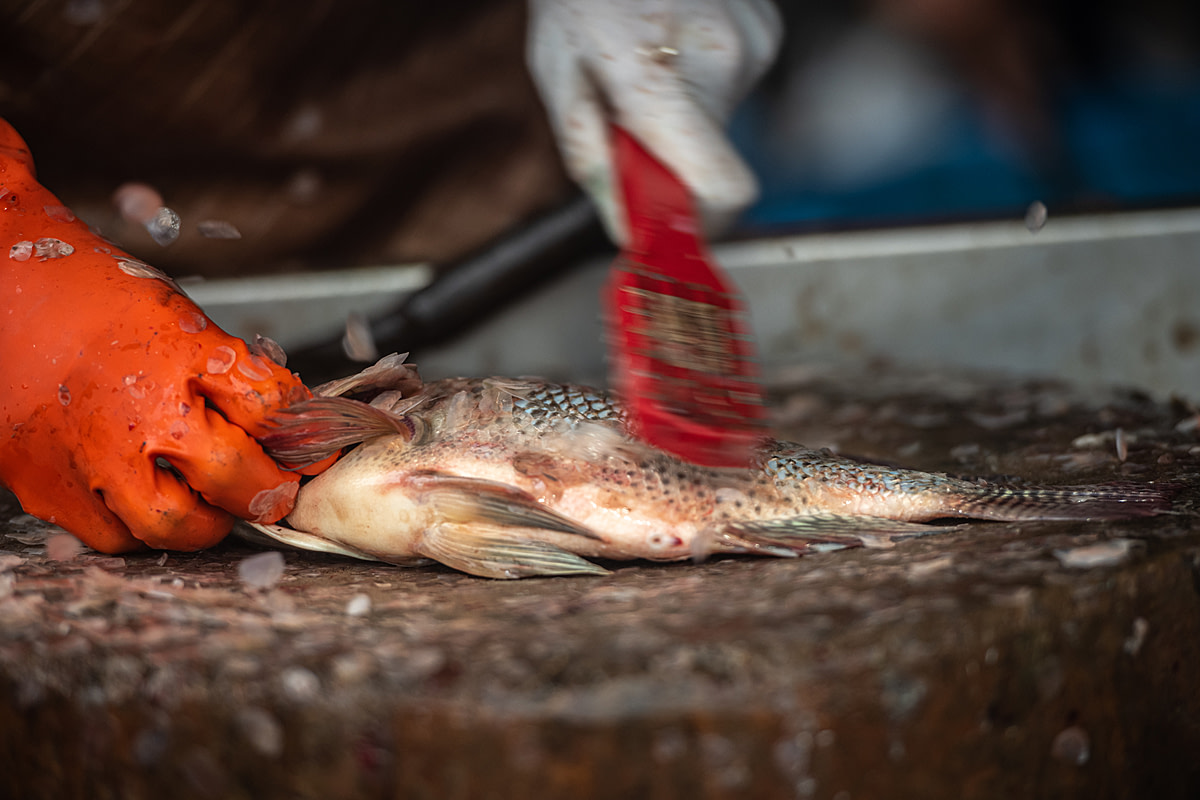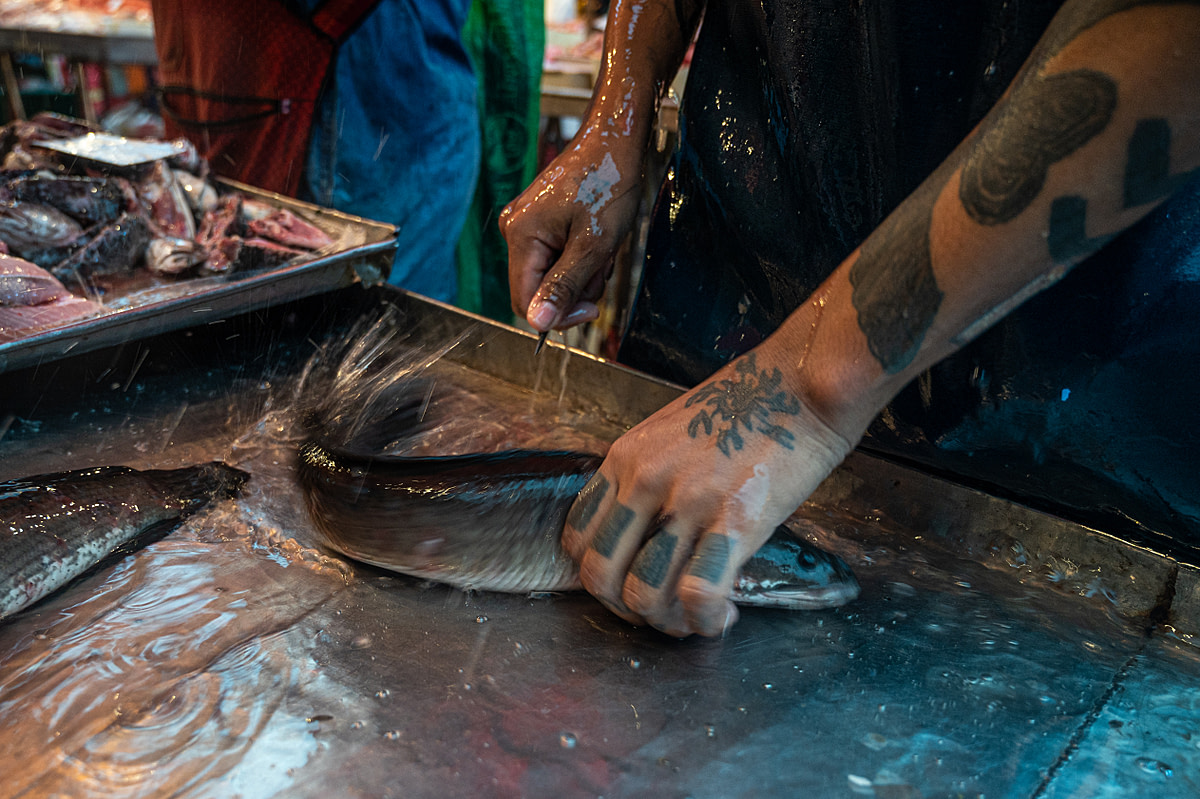A large number of red hybrid tilapia feed on food pellets, in a crowded floating pen at a fish farm in Thailand. A worker in the background tosses a handful of pellets into the water. Thailand, 2021.
Mako Kurokawa / Sinergia Animal / We Animals
[Content warning: Contains confronting images and/or video footage]
A new investigation by Sinergia Animal and We Animals has revealed intense suffering in the Thai fish industry, with footage exposing the reality of how fish are farmed, killed and sold in Thailand.
During a week-long investigation, We Animals documented the supply chain and welfare of widely farmed fish species in Thailand’s aquaculture industry, specifically focusing on tilapia (Oreochromis spp.), of which Thailand is a significant world producer.
Photographer: Mako Kurokawa
Videographer: Taichi Kaito
In collaboration with: Sinergia Animal
“It’s devastating to think this is how millions of animals live and die in our country. Scientific research shows fish have the capacity to experience pain, fear and stress. Nonetheless, they’re often dismissed as having no capacity to feel and are treated in ways that would be illegal for other animals.” — Wichayapat Piromsan, Sinergia Animal’s Public Affairs Director of South East Asia
Our investigation shows fish:
- Living in unsanitary conditions in both big and small farms.
- With signs of disease and bacterial infection.
- Being tossed around, stored live in ice, and slowly asphyxiating out of the water.
- Left dead in the ponds and eaten by other fish.
A pile of dead red hybrid tilapia is cast aside in a plastic drum after being removed from floating pens by workers at a fish farm in Thailand. Thailand, 2021.
Mako Kurokawa / Sinergia Animal / We Animals
Inside Thailand's Fish Farms & Wet Markets
Local farmers are frequently the operators of small-scale fish farms in Thailand, selling their fish wholesale primarily to rural wet markets for retail consumer purchase. Standards on such farms may be less stringent than on farms that supply large corporate chains.
Our investigators collected evidence of unsanitary conditions on tilapia farms, where fish lived in visibly dirty water. We observed dead fish floating in the pens and ailing fish with bulging white eyes, possibly caused by the presence of Streptococcus bacteria. The footage obtained also shows fish being taken out of water and tossed into buckets or dropped onto the ground, left out of water to die slowly from suffocation.
Densely packed red hybrid tilapia lie motionless in the murky water of a floating pond after being sedated with clove oil during the harvest at a fish farm in Thailand. Clove oil is a fast acting sedative that is used to calm fish prior to the harvest, making it easier for workers to handle the fish and minimize damage to them from too much struggling. Thailand, 2021.
Mako Kurokawa / Sinergia Animal / We Animals
Live Nile tilapia jump and squirm as they are dumped onto a metal tray with no water to be sorted during the harvest at an industrial fish farm in Thailand. Thailand, 2021.
Taichi Kaito / Sinergia Animal / We Animals
An aerial view of a red hybrid tilapia fish farm on a river. Thailand, 2021.
Taichi Kaito / Sinergia Animal / We Animals
In addition to poor animal welfare on these farms, there are also environmental concerns. Tilapia are a herbivorous species, but in these farms, they are fed fishmeal, which is made out of wild fish caught in the ocean. According to the Food and Agriculture Organization (FAO), the use of this type of feed in aquaculture exacerbates the issue of overfishing and threatens the ocean’s biodiversity.
This investigation also documented the abuse, slaughter and processing of fish at two of the country’s largest markets, Khlong Toei and Talaad Thai.
In Khlong Toei, the largest wet market in Bangkok, our investigators observed vendors striking fish on their heads with a cleaver, sometimes killing or rendering unconscious, sometimes not. Vendors then chop, descale, and gut them, often while still alive.
A fishmonger scales a Nile tilapia after slaughtering the fish at wet market in Thailand. Tilapia are widely consumed fish, and they are among the most popular species for aquaculture in Thailand. Thailand, 2021.
Mako Kurokawa / Sinergia Animal / We Animals
Since customers prefer the freshest fish possible, to keep some fish alive without writhing during processing, vendors used a spike to penetrate their brains, causing paralysis. If not rendered unconscious by spiking, paralyzed fish may remain capable of feeling and observing what happens to them.
In Talaad Thai, a market in the north of Bangkok where people buy products for resale and distribution throughout Thailand, fish are packed into plastic bags while still alive and die slowly while gasping for air.
Live Nile tilapia slowly suffocate in plastic bags on display at a wet market in Thailand. Tilapia are widely consumed fish, and they are among the most popular species for aquaculture in Thailand. Thailand, 2021.
Taichi Kaito / Sinergia Animal / We Animals
A worker hits catfish on the head with a meat cleaver to stun them before removing the scales with a wire brush, at a wet market in Thailand. Thailand, 2021.
Taichi Kaito / Sinergia Animal / We Animals
Having suffered all the cruelty of the farms and markets, some fish still have to endure being transported to big retailers where they will be sold live. In Siam Makro, one of Thailand’s largest retailers, our investigation revealed live tilapia being displayed for sale in crowded and murky tanks. Many of them appeared injured and unhealthy.
Fish Feel
Science has shown that fish can feel pain, fear and stress, which suggests they also have the capacity to suffer. They are also intelligent, with studies showing their capacity to learn. Some fish species use tools to hunt, opening shells by hitting them against rocks and even protecting their eggs from threats by putting them into shells they can carry around.
“We are inviting our society to be kinder and take into consideration the immense suffering of these sentient beings. Not only is the system cruel and inhumane to fish, the sanitary conditions are also questionable, not to mention the environmental impact in this critical moment of humanity’s history.” — Wichayapat Piromsan




















Thailand, 2021.
Mako Kurokawa / Sinergia Animal / We Animals
Join Sinergia Animal in urging Thai producers and retailers to provide better welfare for fish, and asking Makro to stop selling live fish. You can help make this a reality by taking action here.
Data sources: Food and Agriculture Organization / ScienceDirect
Photographer: Mako Kurokawa
Videographer: Taichi Kaito
In collaboration with: Sinergia Animal
To view more images and video from this collection, visit our Thailand Fish Farms & Markets gallery.

